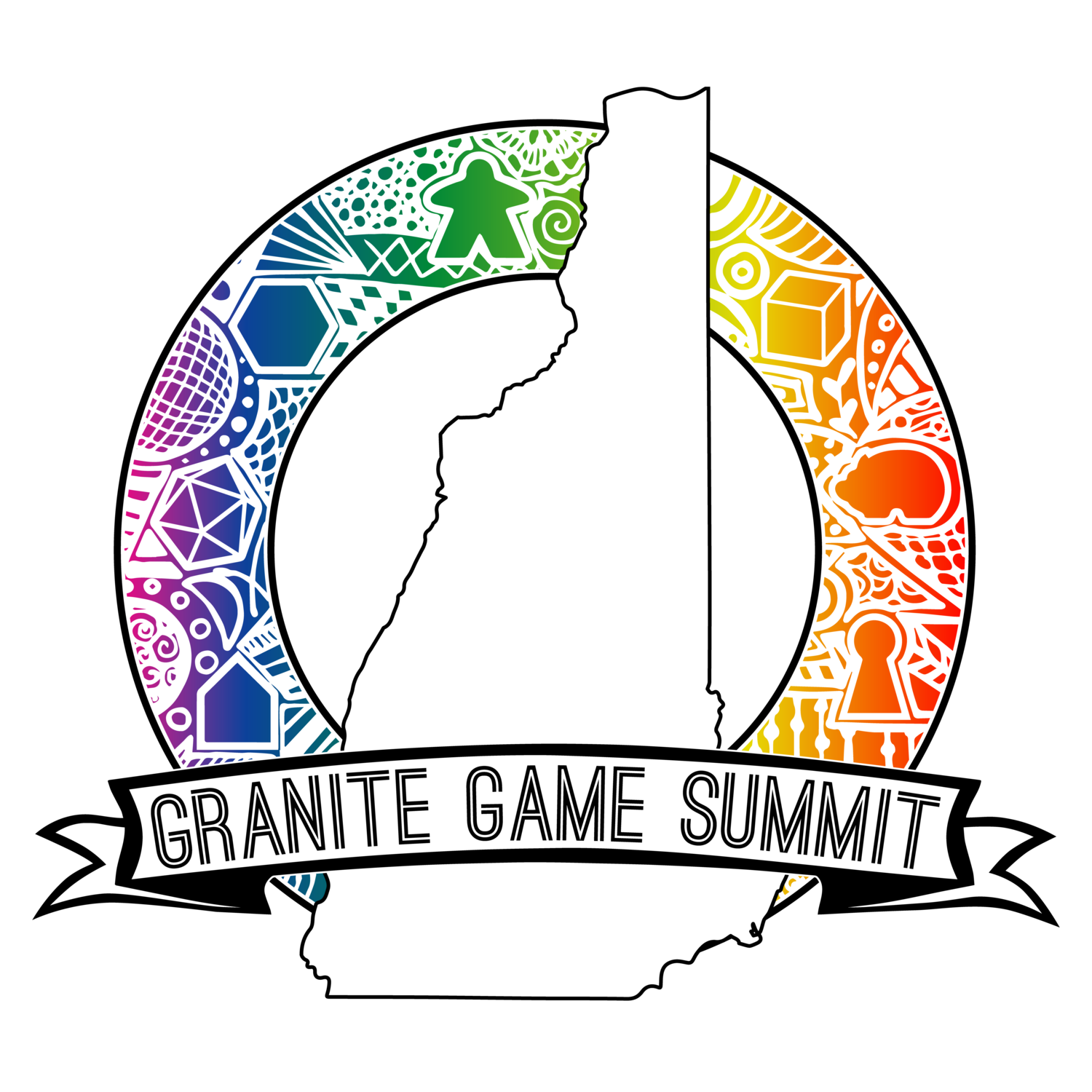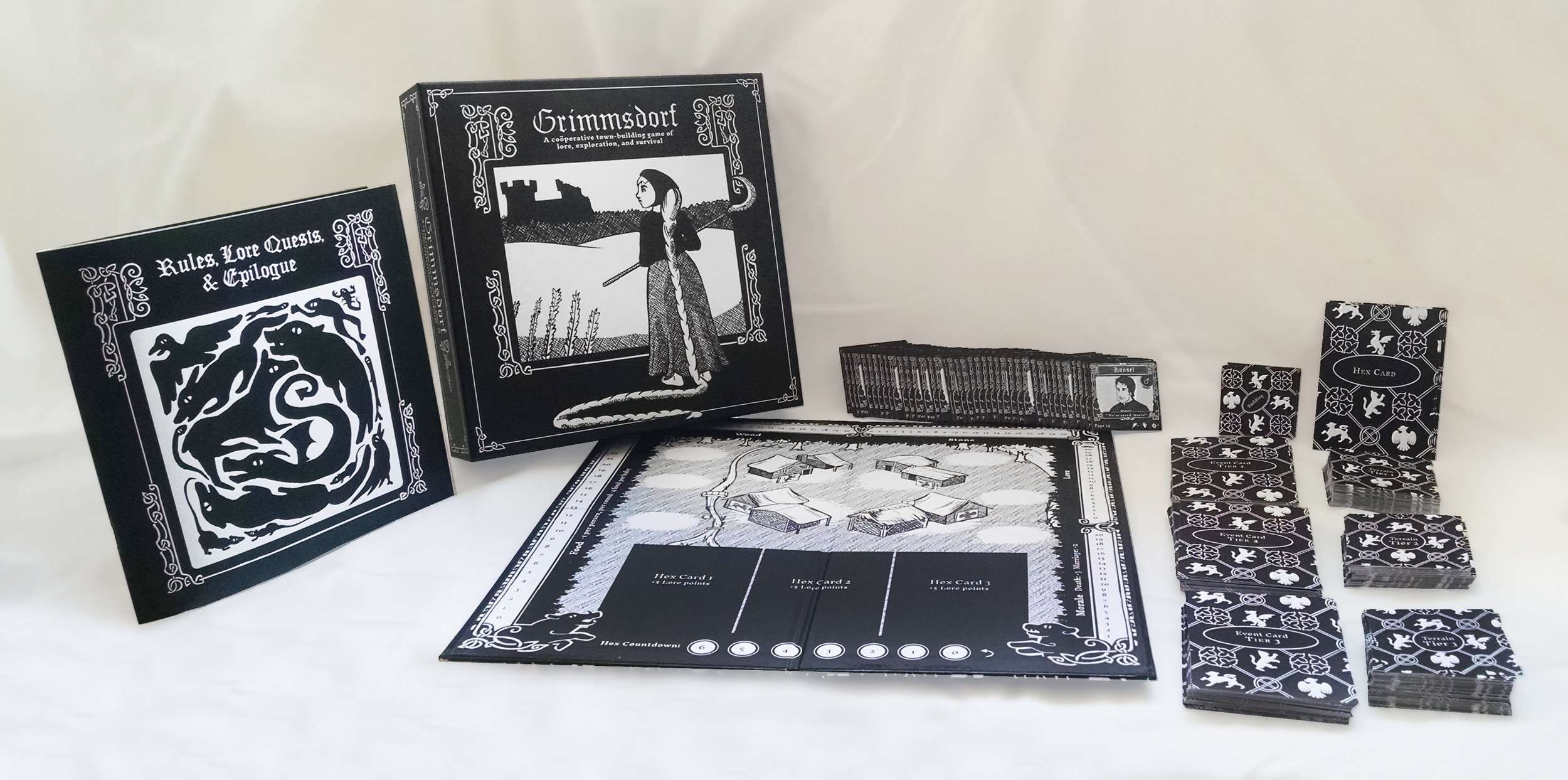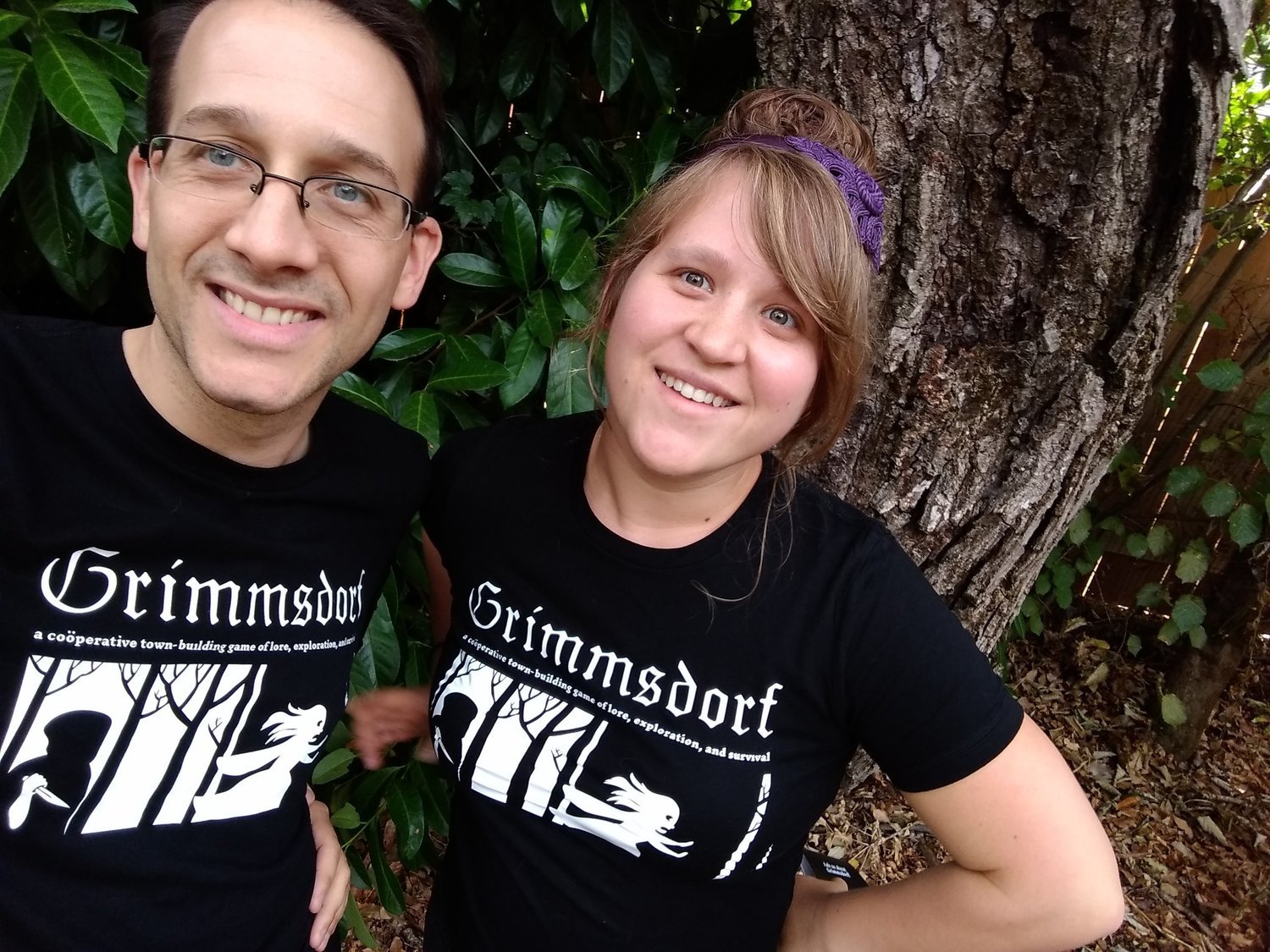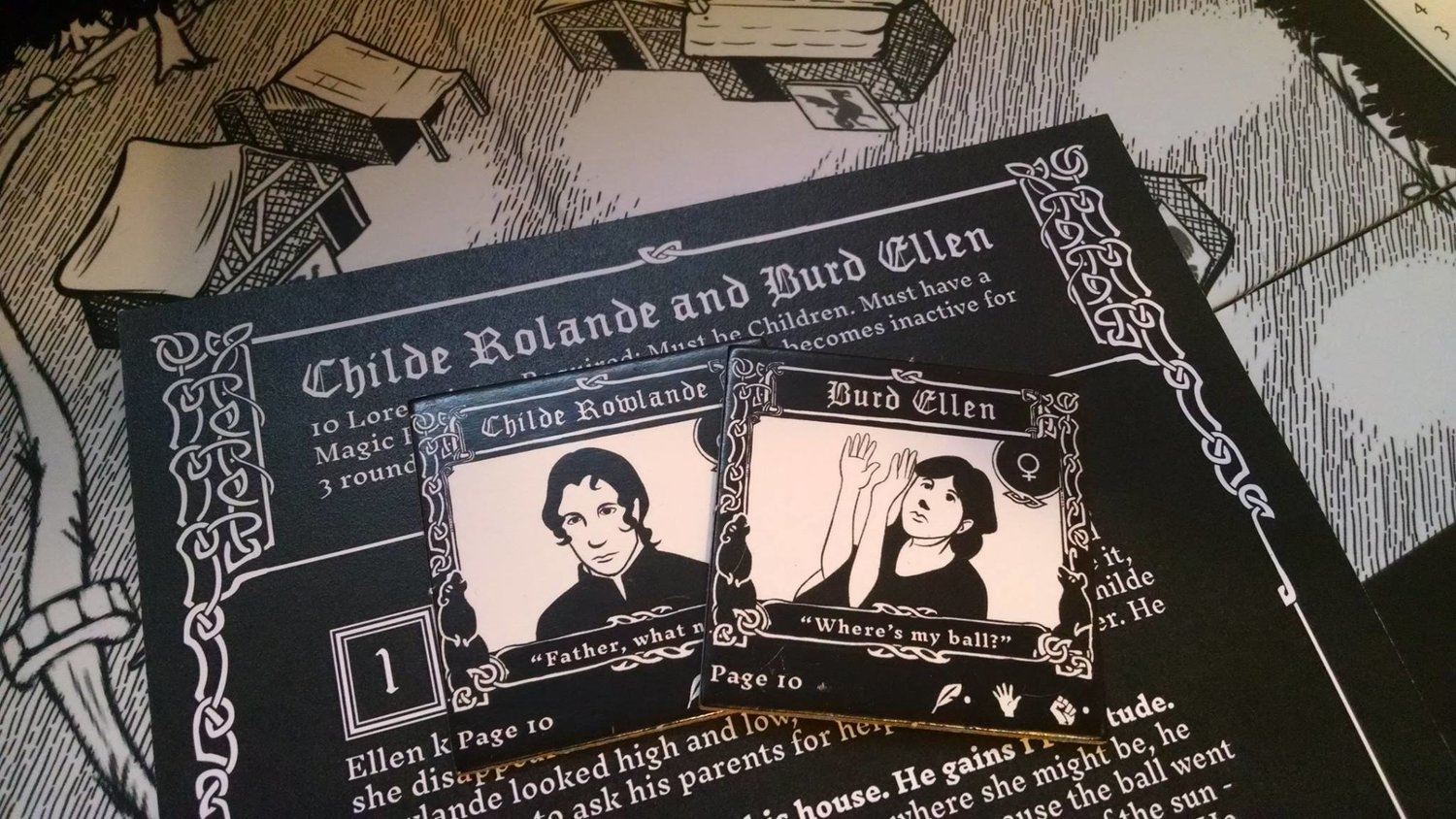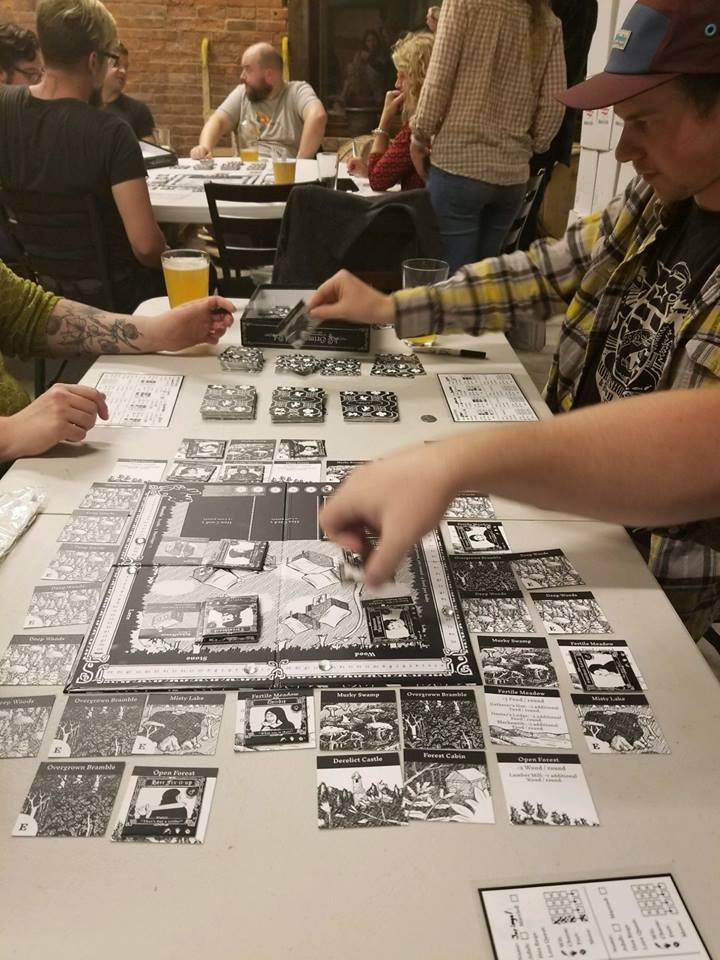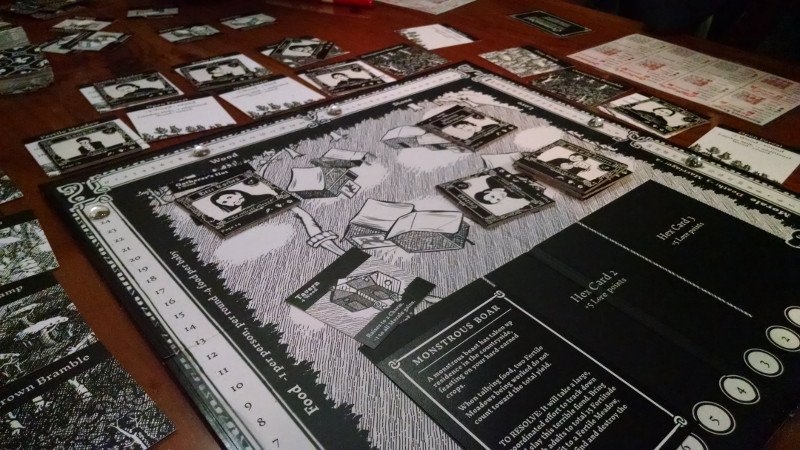Elle Kelsheimer & Mike Caputo
Today we are featuring Mike Caputo and Elle Kelsheimer designers of Grimmsdorf. Mike Caputo & Elle Kelsheimer work in technology by day, but at night they are Calamity Bay Games, where they turn their passions for strategy and atmosphere into immersive board games. Their most recent creation is Grimmsdorf; they have presented it at a variety of local game conventions, where it has been well-received by players and fellow game designers alike. They are pending evaluation by a prominent publisher. They live together in Portland, OR where they are grateful for any sunshine they can get.
THREE RANDOM FACTS ABOUT ELLE:
She has too many hobbies and definitely doesn't have time to devote to get good at all of them. Non-board-game-related interests include: costume-making, sculpting, woodworking, gardening, camping, hiking, writing and illustrating.
As a kid, Elle hated board games. She was only exposed/ forced to play games like Risk and Monopoly. She couldn't have known.
Elle is an Oregon native. Weird, huh?
THREE RANDOM FACTS ABOUT MIKE:
Mike studied history in school, which has been very helpful for board game design. It also makes him the "random history facts" guy at parties.
He had a solo music project for 5 years, though he can't play any conventional instruments.
Because Mike is originally from New York, he has a superpower which allows him to sustain himself entirely on pizza.
Questions by Kimberly Revia (KR), answers by Elle Kelsheimer (EK) and Mike Caputo (MC).
THREE BOARD GAME RELATED QUESTIONS:
KR: What inspired you to start designing board games?
EK: Lots of things. For Grimmsdorf specifically, I was inspired by the portion of my History of German Intellectualism studies that covered Märchen, or folk tales, and learned about the relationship fairy tales have with culture. It's especially interesting to ponder Americans' relationship with these stories, as we have very specific criteria for the tales we'll popularize and those which stay obscure. It says a lot about our cultural identity.
Also, I really like town building games.
MC: I was inspired after spending time thinking deeply about games I didn't enjoy playing, and why I didn't enjoy them. This led to a few projects where we modded games that we owned but didn't enjoy, re-purposing the mechanics and creating our own. We got a lot of positive feedback from friends, so we were emboldened to start creating our own games and things just kept going from there. Elle and I have a lot of disparate interests and skills that have come together really well for board game design.
KR: Which part of designing has been the most enjoyable so far?
EK: It's a toss-up. It was immensely satisfying to see all the parts come together to create a game people (Even strangers O.O!) enjoy playing. I also have really enjoyed meeting other game designers.
MC: I really enjoy the process of researching original source material, and drawing on it as inspiration for game ideas: both in terms of mechanic and theme. Bringing those insights to life can be a real thrill, and I love to share that with others.
KR: How did you go about play-testing Grimmsdorf?
EK: My day job is a UX designer/ researcher, and a big part of that is testing users' interactions with software systems. It did not take much to adapt these skills to testing Grimmsdorf. We actually have a longer blog post about this (https://grimmsdorf.com/blog/what-to-know-when-playtesting) but the the biggest takeaways are:
- When testing, don't provide any information the player couldn't get from the material provided in the box. You will not be shipped with each copy to provide clarification.
- Be open to criticism. Encourage it. Practice friendly (or at least neutral) expressions and body language while it's being delivered. You can sort through what is helpful or not later, but you need outside perspectives to make your game the best it can be.
MC: Blind playtesting is critical to getting good feedback. Friends and family can never give truly open feedback, past a certain point. Giving playtesters a chance to write out their feedback on sheets of paper or online - anonymously - is very important. Additionally, having the humility of knowing that your game isn't perfect will leave your heart and mind open to making improvements - and knowing how to take feedback is fundamental to that. I wrote about that in a blog post on our site (https://grimmsdorf.com/blog/how-to-take-feedback). And lastly, for every game I play or observe, I ask myself: was this game challenging, and fun? If not, how could it have been?
THREE QUESTIONS JUST FOR FUN:
KR:What does your ideal game night look like?
EK: Beers (perched on different surfaces than the gaming table), good friends, and a couple short ones and a medium-length one OR one short one and a longer game.
MC: An ideal night is when people who have different preferences for games - be it duration, complexity, or mechanics - play a new game together, and all find things to enjoy about it.
KR: If you could borrow from any *world* from a book, movie, comic etc. to design a game around, what would you choose?
EK: This is going to sound pretentious, but I'm most interested in creating things that say something about the actual lived experiences of people, so it would have to be a world that dealt heavily with themes like that. I'm sure there's already a Hunger Games board game, but I'd probably do something along those lines.
MC: I like to borrow from... the real world! I tend to not be interested in much fantasy, because most fantasy is derivative of something in the real world. That "original" thing in the real world is usually way more interesting to me, because it involved real people, real circumstances, and real consequences. I love the setting of the History of the Peloponnesian War - I can imagine designing a game in that world, but I'm deterred by how massive of a game it would need to be to encompass the full experience of that epoch.
KR: What do you enjoy about attending conventions?
EK: I love the energy from people who are really passionate about what they're creating. I also love to see people who are playing Grimmsdorf start to really put their heads together to strategize and work their way out of seemingly-impossible problems. There's this flow and concentration that's especially exciting to see among people that just met.
MC: I love meeting other game creators. Seeing other peoples' passions come to life, to share their creativity and hard work, is a great joy for me. And yes, I like hearing people say that they love Grimmsdorf and that they want to own a copy.
You can find more info on Elle and Mike as well as their games by following the links below!
Join their mailing list via their website: https://grimmsdorf.com/join-mailing-list
Twitter: https://twitter.com/grimmsdorf
instagram: https://instagram.com/grimmsdorf
Facebook: https://facebook.com/grimmsdorf
